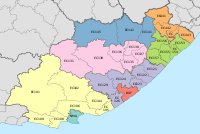Ikwezi Local Municipality
Ikwezi | |
|---|---|
 Location in the Eastern Cape | |
| Country | South Africa |
| Province | Eastern Cape |
| District | Sarah Baartman |
| Seat | Jansenville |
| Wards | 4 |
| Government | |
| • Type | Municipal council |
| • Mayor | Sizwe Alfred Mngwevu |
| Area | |
| • Total | 4,563 km2 (1,762 sq mi) |
| Population (2011)[2] | |
| • Total | 10,537 |
| • Density | 2.3/km2 (6.0/sq mi) |
| Racial makeup (2011) | |
| • Black African | 37.2% |
| • Coloured | 54.6% |
| • Indian/Asian | 0.2% |
| • White | 7.6% |
| First languages (2011) | |
| • Afrikaans | 69.6% |
| • Xhosa | 25.8% |
| • English | 2.6% |
| • Other | 2% |
| Time zone | UTC+2 (SAST) |
| Municipal code | EC103 |
Ikwezi Local Municipality was an administrative area in the Sarah Baartman District Municipality of the Eastern Cape in South Africa. Ikwezi is an isiXhosa name that means "morning star".[4] After municipal elections on 3 August 2016 it was merged into the larger Dr Beyers Naudé Local Municipality.
Main places
The 2001 census divided the municipality into the following main places:[5]
| Place | Code | Area (km2) | Population | Most spoken language |
|---|---|---|---|---|
| Jansenville | 20302 | 23.83 | 1,433 | Afrikaans |
| Klipplaat | 20303 | 2.19 | 1,257 | Afrikaans |
| KwaZamukucinga | 20304 | 1.18 | 3,477 | Xhosa |
| Wongalethu | 20305 | 1.62 | 1,640 | Afrikaans |
| Remainder of the municipality | 20301 | 4,420.87 | 2,558 | Afrikaans |
Politics
The municipal council consists of seven members elected by mixed-member proportional representation. Four councillors are elected by first-past-the-post voting in four wards, while the remaining three are chosen from party lists so that the total number of party representatives is proportional to the number of votes received. In the election of 18 May 2011 the African National Congress (ANC) won a majority of five seats on the council. The following table shows the results of the election.[6][7]
style="width: 2px; color:inherit; background-color: #006600;" data-sort-value="African National Congress" | style="width: 2px; color:inherit; background-color: #005BA6;" data-sort-value="Democratic Alliance (South Africa)" | style="width: 2px; color:inherit; background-color: #DCDCDC;" data-sort-value="Independent (politics)" || Party | Votes | Seats | ||||||
|---|---|---|---|---|---|---|---|---|
| Ward | List | Total | % | Ward | List | Total | ||
| ANC | 2,346 | 2,356 | 4,702 | 66.0 | 4 | 1 | 5 | |
| DA | 1,044 | 1,211 | 2,255 | 31.6 | 0 | 2 | 2 | |
| Independent | 168 | – | 168 | 2.4 | 0 | – | 0 | |
| Total | 3,558 | 3,567 | 7,125 | 100.0 | 4 | 3 | 7 | |
| Spoilt votes | 62 | 61 | 123 | |||||
References
- ^ "Contact list: Executive Mayors". Government Communication & Information System. Archived from the original on 14 July 2010. Retrieved 22 February 2012.
- ^ a b "Statistics by place". Statistics South Africa. Retrieved 27 September 2015.
- ^ "Statistics by place". Statistics South Africa. Retrieved 27 September 2015.
- ^ South African Languages - Place names
- ^ Lookup Tables - Statistics South Africa[permanent dead link]
- ^ "Results Summary – All Ballots: Ikwezi" (PDF). Independent Electoral Commission. Retrieved 24 November 2013.
- ^ "Seat Calculation Detail: Ikwezi" (PDF). Independent Electoral Commission. Retrieved 24 November 2013.


